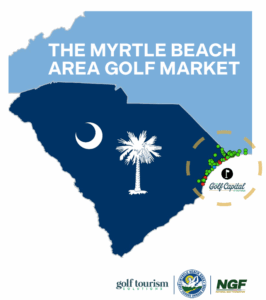The first-ever comprehensive economic impact study of the Myrtle Beach area golf market, known as The Golf Capital of the World®, illustrates that golf is a powerful economic driver to the region. According to the report based on 2024 data, golf is a $1.6 billion industry, supporting 13,340 jobs, generating $482.9 million in wages and benefits, and producing $134.8 million in state and local taxes.
“Golf has differentiated, developed and diversified the Myrtle Beach area for nearly 100 years,” said Tracy Conner, Executive Director of the Myrtle Beach Area Golf Course Owners Association. “Beyond the direct economic benefits, golf has an immeasurable quality of life impact for residents, generates significant charitable contributions for our community and is committed to responsible environmental stewardship.”
The Myrtle Beach area golf market includes South Carolina’s Horry and Georgetown counties and extends northward into Brunswick County, N.C. At the end of 2024, there were 78 golf courses at 63 public golf facilities and six private golf clubs in operation, for a total of 69 facilities in this defined geographic region. In addition, there were 10 other “off-course” facilities (golf entertainment, short course and simulators).
“Authentic hospitality and accessible world-class golf have attracted people to move, live or visit the Myrtle Beach area for generations,” said Ryan Cannon, Executive Director of Golf Tourism Solutions. “It’s impossible to overstate the positive impact to our region.”
An estimated 759,000 golfers traveled more than 50 miles to play the region’s courses in 2024, accounting for up to 1.4 million rounds. Their spending on lodging, dining, transportation and entertainment contributed more than $705 million directly into the local economy and supported more than 7,300 tourism-related jobs.
The study was a collaboration between the National Golf Foundation, Golf Tourism Solutions, the Myrtle Beach Area Golf Course Owners Association, and South Carolina Department of Parks, Recreation and Tourism. The research was completed by using operational, economic and tourism data from 2024. Key survey questions centered on operational data, including rounds played, revenues and expenses, as well as capital expenditures and information on employment/staffing.
Economic Highlights:
- $1.6 billion total impact (direct, indirect & induced)
- 13,340 jobs
- $482.9 million in wages & benefits
- $134.8 million in state & local taxes
- More than 3 million estimated rounds

